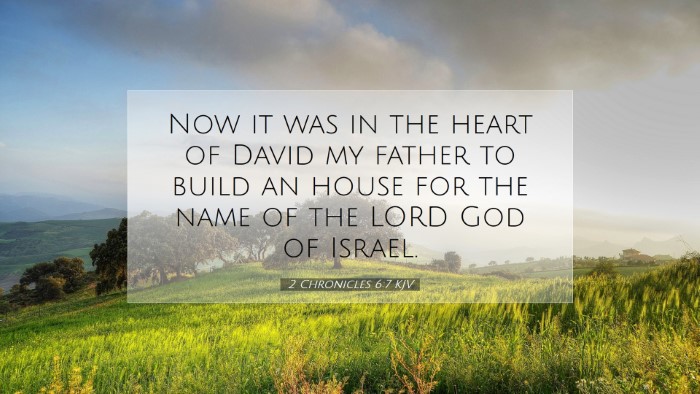Commentary on 2 Chronicles 6:7
Verse: 2 Chronicles 6:7 - "And it was in the heart of David my father to build a house for the name of the Lord God of Israel."
Introduction
The verse in question captures a significant moment in the biblical narrative, reflecting the heart of King David as he expresses his desire to build a temple for the Lord. This verse serves as a prelude to Solomon's temple construction and is essential for understanding the broader themes of worship and devotion in the Old Testament.
Historical Context
The context of this verse is vital. David, having established himself as king and secured peace in Israel, turns his attention towards God and the worship due to Him. The realization that the Ark of the Covenant had been residing in a tent while he lived in a palace weighed heavily on David’s heart. His intention reflects a deep desire not just for building but for a permanent dwelling for God among His people.
Matthew Henry's Insight
Matthew Henry emphasizes that David's desire stemmed from a sincere love for God and His glory. He notes that David had both the material means and the spiritual conviction to undertake this task. However, he acknowledges that God’s will ultimately directed the fulfillment of this desire through Solomon, which points to the providence at work in the life of Israel.
Albert Barnes' Commentary
Albert Barnes remarks on the implications of David's intentions. He points out that the phrase "it was in the heart" signifies that though David did not execute the building himself, his intentions were noble and directed by God’s spirit. Barnes underscores that God’s approval of David’s heartfelt desire illustrates the important principle that desires aligned with God’s will are pleasing to Him, even if not accomplished in the manner we expect.
Adam Clarke's Perspective
Adam Clarke highlights the emotional and spiritual elements of David’s intention. He indicates that David was not merely seeking to create a physical structure, but he yearned for a place where God's name could be honored and worshiped appropriately. Clarke asserts that this demonstrates an understanding of worship that transcends mere ritual; it captures God’s presence and His relationship with His people.
Theological Significance
This verse brings forth several theological themes that are pertinent for pastors, students, and scholars alike:
- Desire for Worship: David’s desire encapsulates the human longing for a connection with the divine and the importance of creating spaces for communal worship.
- God’s Sovereignty: While David initiated this idea, it was God who determined the fulfillment, signifying that God governs the plans of mankind.
- Legacy of Worship: The significance of David's desire is not lost, as it paves the way for Solomon’s temple, which becomes central to Israelite worship.
Practical Applications
For contemporary readers and leaders, this verse encourages an introspection regarding our own desires for ministry and service. Is our heart set on glorifying God in all our endeavors? The following applications can be drawn:
- Evaluate Intentions: Seek to understand the motivations behind leadership decisions and personal ambitions within ministry.
- Align with God’s Will: Acknowledge that not every desire will come to fruition as expected, yet remain open to God’s ultimate direction.
- Cultivate Spaces for Praise: Consider how we can foster environments conducive to worship, reflecting the spirit of what David intended.
Conclusion
2 Chronicles 6:7 encapsulates a profound moment in Israel's history, signifying David's desire to honor God through the construction of a temple. Both Matthew Henry, Albert Barnes, and Adam Clarke provide invaluable insights into the motivations, implications, and outcomes of David’s wish. This verse embodies the intersection of intention, divine sovereignty, and the legacy of worship, offering rich reflections for anyone engaged in the scholarship of Scripture.


